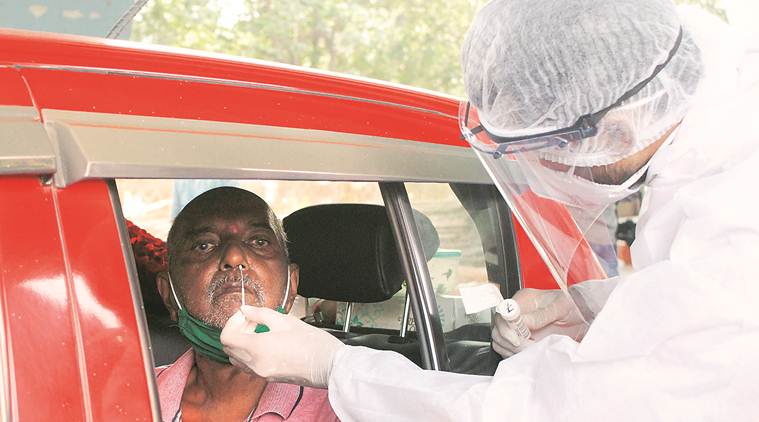 Samples being taken for testing in Mumbai. Deepak Joshi
Samples being taken for testing in Mumbai. Deepak Joshi
Scientists at the Council of Scientific & Industrial Research — Institute of Genomics and Integrative Biology (CSIR-IGIB) have developed a low-cost, paper-strip test which can detect the new coronavirus within an hour. The test, named Feluda after a fictional detective character created by Satyajit Ray, is expected to cost around Rs 500 against the RT-PCR test that costs Rs 4,500 in private labs.
Developed by a team led by two scientists, Dr Souvik Maiti and Dr Debojyoti Chakraborty, the test is based on a bacterial immune system protein called Cas9. It uses cutting-edge gene-editing tool Crispr-Cas9 system. The team has repurposed it for diagnosis of COVID-19 genetic material.
“We have been working on this for the last two years. This technology is not limited to COVID-19 and can work on any DNA-RNA or single mutations, disease mutations etc. Based on our initial estimates, we think the strip might cost somewhere around Rs 500-600 but the companies will decide the cost. We are waiting for approval from ICMR and then we will move ahead with the companies we are in talks with,” said Chakraborty. Feluda is also an acronym for the scientific name of the test — Fncas9 Editor Linked Uniform Detection Assay.
There are two other technologies developed by MIT and the University of California, Berkeley which also use Crispr systems, but different technology and proteins.
“Their technologies are named Detector and Sherlock. These all are names of fictional detectives, so when we wanted to make something completely Indian, we thought we can keep the acronym as an Indian Detective,” Chakraborty said.
The researchers said there is an urgent need for extensive testing in the country and the paper-based strip will help fill the gap. “Since it is a visual test, there is no need for complicated training, unlike the current RT-PCR test. It can be done rapidly and can be used at any basic community health centre. This is our major goal to make it as simple as possible so that it can be widely and easily used. Any throat/nose swab sample can be taken and then you do an RT-PCR which converts the RNA and makes multiple copies of DNA. Once you have multiple copies of DNA, then you complicit with the Crispr-Cas9 system and you put it into the strip. Once you put it in the strip, the result will come out in one minute,” Chakraborty said. He said they are also working towards eliminating the use of the expensive machine used in RT-PCR tests. “We are working on a technology called Isothermal polymer reaction where the machine is not required.”
Don’t miss these articles on Coronavirus from the Explained section:
‣ How coronavirus attacks, step by step
‣ Mask or no mask? Why the guidance has been shifting
‣ Besides a face cover, should I wear gloves when I go outdoors?
‣ How the Agra, Bhilwara and Pathanamthitta Covid-19 containment models differ